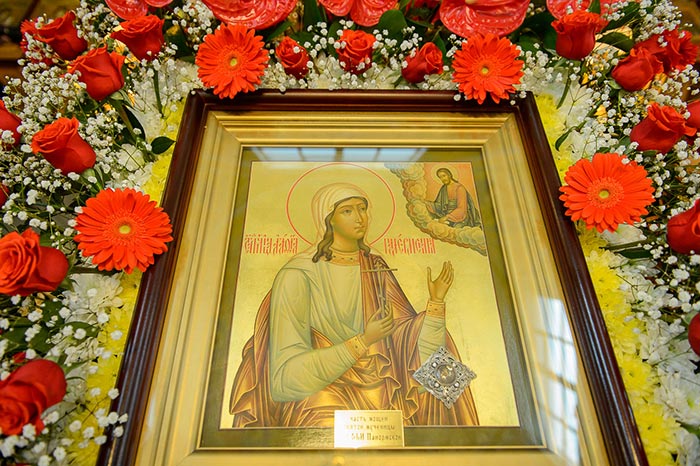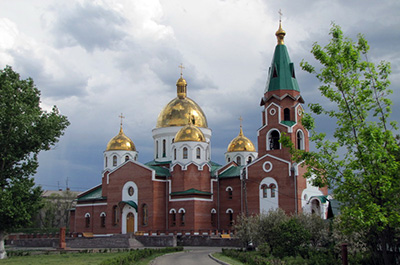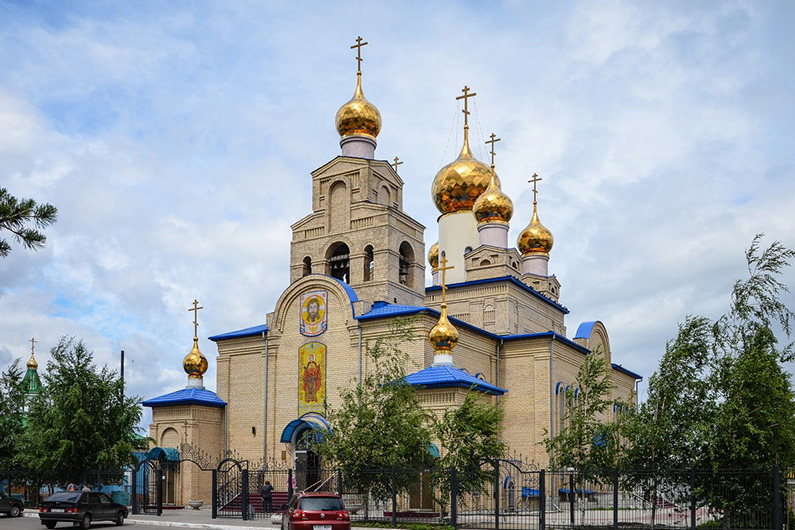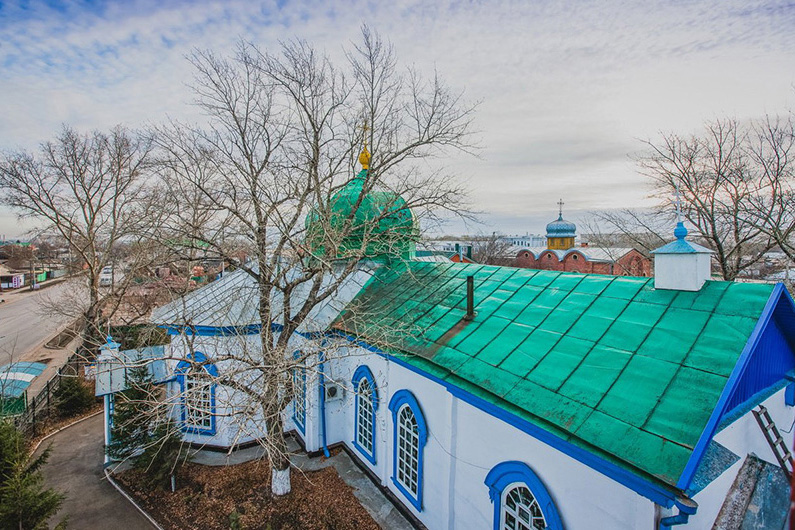
Metropolitan Alexander performed a prayer service for the deliverance of the city of Almaty and Kazakhstan from earthquakes
- 23.01.2024, 10:52
- Новости на английском языке

On the night of January 22-23, a strong earthquake occurred in Almaty. According to the network of seismic stations of the Ministry of Emergency Situations of the Republic of Kazakhstan, the earthquake occurred at 00:09. Later the tremors repeated. The epicenter of the earthquake is located 264 km southeast of Almaty on the border of Kazakhstan and Kyrgyzstan. Energy class – 15.1; magnitude – MPV 6.7; Epicenter coordinates – 41.22° N. 78.65°E; depth – 65 km.
The head of the Orthodox Church of Kazakhstan, Metropolitan Alexander of Astana and Kazakhstan, performed a prayer service to the holy martyr Agathia of Panorma, a particle of whose relics resides in the Iversko-Seraphim Monastery of the southern capital, with a petition to “deliver the city of Alma-Ata, Kazakhstan and all Christian cities and countries from the land of earthquakes and fiery ignitions , protect all people from troubles and misfortunes.”
The Martyr Agathia of Panorma has the special grace to save those who call upon her holy name in prayer from earthquakes, volcanic eruptions, fires, other catastrophes and natural disasters.
On October 13, 2014, with the blessing of His Holiness Patriarch Kirill of Moscow and All Rus', the shrine was donated to the Kazakhstan Metropolitan District by the International Charitable Christian Foundation “Triumph of the Heart” in response to the petition of Metropolitan Alexander and from that moment it has been in the Iveron-Seraphim Monastery.
Life of the Martyr Agathia of Panorma
The Martyr Agathia of Panorma has the special grace to save those who call upon her holy name in prayer from earthquakes, fires, volcanic eruptions and other catastrophes and natural disasters.
The Holy Virgin Agathia lived in the 3rd century on the island of Sicily - in the city of Panorma (now Palermo) and was the daughter of noble Christian parents. During the reign of Emperor Decius Trajan, severe persecution of believers in Christ began throughout the Roman Empire. In 250, the emperor ordered the regional rulers to use all means, including violence, to force Christians to worship idols. The persecution of Christians, which began as a result of this decree, surpassed all previous ones in its cruelty.
The ruler of the city of Panorma, Quintian, having heard about the wealth and beauty of Agathia, sent soldiers after her to bring her to trial as a Christian. Captivated by the beauty of Agathia, he decided to use cunning to distract her from the Christian faith and for this purpose placed her in the house of a pagan widow who led an immoral life. The elderly pagan woman, her daughters and maids tried to seduce Saint Agathia with bright outfits, delicious treats and all sorts of entertainment. But the saint did not succumb to their tricks and, rejecting all pleasures, prayed to the Lord to grant her strength for martyrdom. Neither luxury, nor fun, nor persuasion broke the faith and piety of the young Christian.
Seeing that his cunning did not bring any results, the ruler Quintian became angry and decided to resort to cruel measures. He began to rudely interrogate Agathia why she did not bow to idols.
Irritated by Agathia’s courage and wise answers, the ruler subjected her to cruel torture and then imprisoned her in a stinking prison. Seeing, however, her inflexibility, Quintian ordered his servants to tear the body of the holy virgin with iron pincers and claws. The tormented Agathia was again thrown into prison.
The Apostle Peter appeared to the sufferer in a prison cell and miraculously healed her of her wounds. After the appearance of the Supreme Apostle, an extraordinary light filled the prison all night; The warriors, frightened by the heavenly sign, fled and left the doors open. Saint Agathia, however, did not take advantage of this and did not leave captivity, wanting to accept martyrdom for Christ, and thereby testify to the truth of her faith before the inhabitants of Panormos.
On the fifth day, Saint Agathia was again brought to torture. Quintian was amazed when he saw that the maiden stood before him completely unharmed and radiant with beauty even more than before. But even such a miraculous healing of the martyr did not touch the heart of the cruel ruler. Incited by his cunning advisers, he came up with a sophisticated method of torment - he ordered sharp tiles kindled in the fire to be laid out on the ground, sprinkled with hot coals, and the saint thrown on them.
At this time, a terrible earthquake began in the city and its surroundings, the strongest fortress walls and houses began to collapse, and huge cracks appeared in the ground. During this natural disaster, Quintian's treacherous advisers and the executioners who carried out the torture died. The inhabitants of Sicily, frightened by the catastrophe, ran to Quintianus’s palace and began to demand that he stop torturing the innocent maiden for whose sake the earthquake occurred. The ruler, frightened by the disaster and popular indignation, ordered the torture to stop and the saint to be taken to prison. The martyr, raising her hands to heaven, began to fervently pray to God, and immediately the earthquake subsided.
Having prayed, she peacefully surrendered her spirit into the hands of God. Having learned about her blessed death, the inhabitants of Panorma hastened to come to the prison and took the body of Saint Agathia, prepared it for burial. During the funeral procession, a beautiful young man approached the body of the martyr, who placed a stone tablet in her coffin, on which was the inscription: “Immaculate mind, voluntary sacrifice to God and deliverance to the fatherland.” Having laid down the tablet, the young man immediately became invisible and everyone understood that it was an angel of God.
The fame of the martyr Agathia spread far beyond the borders of Sicily. A church was built over her relics, the modest, simple clothes in which the saint wore were placed on the tomb of the martyr to remind pilgrims of her humility.
A year after the death of the martyr Agathia, Mount Etna, near the Sicilian city of Catana, began to erupt with fiery lava, which flowed like a huge river; Hot stones fell from the crater of the volcano, and the earth in the surrounding area shook and cracked. Residents of Katana, fearing for the death of their city, gathered for prayer at the church of the martyr Agathia. Singing psalms, they took the saint's clothes and stood in the path of the flowing lava. Through the intercession of the martyr Agathia, a miracle happened - the lava stopped flowing, the volcano went out and the earthquake stopped. This miracle was repeated more than once in subsequent centuries, which is why Saint Agathia is prayed to as a protector from earthquakes, volcanic eruptions, mudflows, fires and other disasters.





















